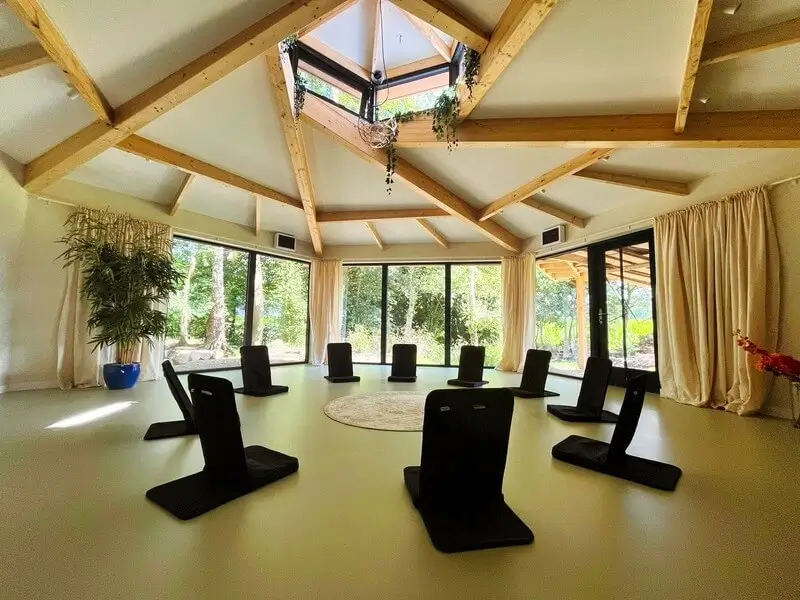Psychedelics – such as psilocybin found in magic truffles – hold incredible potential as tools for self-discovery and healing. However, they are not magical solutions or guaranteed shortcuts to personal growth. The impact of psychedelics depends largely on factors such as the participant’s mindset, their preparation, and the environment in which the experience takes place, As research has shown [1] [2], with proper preparation and skilled psychedelic accompaniment, the potential for meaningful and lasting transformation is greatly enhanced.
Psychedelic accompaniment provides the intentional and respectful support participants need to navigate the profound, often complex layers of a psychedelic journey with clarity and safety. By fostering trust and openness, it creates a foundation for participants to engage deeply with their psychedelic experiences, as shown in research linking accompaniment to increased emotional exploration and therapeutic breakthroughs [3]. This supportive framework enables individuals to dive more deeply into their personal transformation journey with the confidence and security required to face the challenges and insights that arise during the psychedelic process.
The Role of Psychedelic Accompaniment
Psychedelic accompaniment tends to adopt a non-directive approach where facilitators support participants without imposing their interpretations or guiding the journey. Rooted in empathy and respect, this approach prioritises creating a safe and trusting space where individuals feel free to explore their inner worlds without fear of judgment or external interference. However, participants are not left alone as facilitators act as steady, grounding presences, honouring the deeply personal nature of each participant’s psychedelic experience.
Rather than steering participants toward specific outcomes, psychedelic accompaniment focuses on holding a compassionate, open space that enables participants to engage with their journey more authentically. Facilitators encourage participants to trust their inner guide and healer and allow their experiences to evolve naturally. Interventions, when needed, are minimal and gentle, aimed only at ensuring safety or providing support during particularly intense or challenging moments or when someone feels stuck in their process. This honours the autonomy of the participant, fostering a deeper and more meaningful connection to the transformative potential of the plant medicine itself.
The Facilitator’s Role: A Steady Presence in the Unknown
Facilitators play a central role in psychedelic accompaniment, offering a supportive and attuned presence that enables participants to better navigate their psychedelic journey. The facilitators’ role is not to lead or interpret the experience but to remain empathetic and grounded, providing assistance when needed using their skill and intuition. Research has shown that this kind of facilitator presence reduces anxiety and promotes profound insights, even during emotionally intense moments [4]. By closely following each participant’s process, facilitators create the right setting that respects the deeply personal nature of the psychedelic experience.
Facilitators may use specific grounding techniques to help participants during moments of emotional intensity or uncertainty, but they understand that the most profound experiences often arise when individuals explore without interference. By fostering trust and safety, facilitators ensure participants feel held and supported, even in their most vulnerable moments, enabling meaningful and transformative experiences to unfold naturally.
Safety, Trust, and Openness: The Foundations of Transformation
Creating a foundation of safety, trust and openness is critical to psychedelic accompaniment. By cultivating a non-judgmental environment, participants are freer to embark on their plant medicine journey without fear of judgment or external interference. They are more willing to embrace vulnerability and engage with challenging emotions when they feel secure, as research has highlighted [5]. Facilitators provide empathetic support, enabling participants to face deep-seated emotions or beliefs more confidently, leading to profound change.
When participants feel secure and free to be themselves, they are more willing to embrace vulnerability and confront challenging moments during the psychedelic trip. Psychedelic accompaniment prioritises meeting each participant exactly where they are, rather than imposing preconceived notions or outcomes. This ensures that participants are supported in alignment with their own values, beliefs and experiences.
Safety in psychedelic accompaniment encompasses emotional, physical, and energetic dimensions. Emotional safety is nurtured through adopting a non-judgemental approach where all feelings, thoughts and sensations are accepted without reservation. Physical safety is ensured by providing a comfortable, distraction-free environment where participants can focus fully on their inner journey, and also ensuring that participants engage with their psychedelic trip in a physically safe way. Energetic safety involves providing the necessary tools to participants, such as grounding practices, so as to help them remain centred during intense moments. Together, these elements create a secure space where participants can let go more and engage with their personal process during the retreat.
Preparation: Setting the Foundation
Effective psychedelic accompaniment begins well before the psychedelic trip itself. The preparation phase lays the foundation for a meaningful and fruitful experience, with facilitators guiding participants in setting intentions and addressing expectations. Participants are encouraged to reflect on what they hope to explore, while also embracing the unpredictable nature of psychedelic journeys. This phase also includes discussions about potential challenges, providing tools for navigating the unknown, and addressing fears or concerns.
At Conscious Growth we view the psychedelic accompaniment process as starting from the first moment when a participant inquires about a retreat. From the moment they reach out, we work towards getting to know them personally in order to better prepare them for the psychedelic retreat and be better able to accompany them during their trip. We see this phase of accompaniment as a way to ensure that we can fully accompany participants through the whole journey they are trusting us with, which is why we look in great detail at the physical and emotional circumstances of each participant.
Psychedelic Accompaniment During the Retreat
The core of the psychedelic accompaniment process unfolds during the retreat itself, where facilitators create an environment of openness and support that allows participants to engage deeply with their psychedelic experience. At the plant medicine retreats we offer at Conscious Growth, we also aim at fostering connections between participants to build a supportive and trusting retreat atmosphere. Our facilitators are always available to provide any emotional support that’s needed before, during and after the psychedelic journey.
During the psychedelic trip, facilitators act as external anchors for participants, offering grounding practices or emotional reassurance when needed. By maintaining a balance of presence and non-directiveness, facilitators ensure that participants feel held, safe and free to engage deeply with their personal journey.
Integration: Bringing the Retreat into Daily Life
Psychedelic accompaniment extends well beyond the retreat, extending into the integration phase that follows – something crucial for sustaining the benefits of psychedelics [6]. Integration focuses on helping participants make sense of their experiences and identify how they relate to their daily life, including any meaningful steps that need to be taken. By treating integration as an ongoing process, participants are encouraged to view transformation as a gradual process rather than a singular event.
At Conscious Growth, we offer extensive integration support as part of our psychedelic accompaniment programme. This includes individual and group integration sessions, access to integration circles and phone support. For those desiring extended integration, we also provide optional individual psychotherapy sessions.
The Transformative Power of Psychedelic Accompaniment
Psychedelic accompaniment can help individuals reap more benefits from their psychedelic experiences, enabling them to engage deeply with their personal growth and transformation. By fostering safety, trust, openness and presence, facilitators help create the conditions for profound exploration, personal healing and self-discovery. This enables participants to explore their psychedelic journey with confidence and authenticity, providing the supportive environment necessary for enduring change.
As interest in plant medicines continues to grow, the importance of psychedelic accompaniment becomes ever more apparent as it allows meaningful experiences to emerge and take root. By balancing non-directiveness with empathetic presence, psychedelic accompaniment honours participants’ autonomy while embracing the transformative nature of the psychedelic experience. Through ongoing support during and after the retreat, psychedelic accompaniment helps participants integrate their insights into daily life, enabling them to connect more deeply with themselves, others and the world around them, and ensuring that the journey’s impact resonates long after the retreat has ended.

- Watts, R., Day, et al. (2017). Patients’ accounts of increased ‘connectedness’ and ‘acceptance’ after psilocybin for treatment-resistant depression. Journal of Humanistic Psychology, 57(5), 520-564. https://doi.org/10.1177/0022167817709585
- Haijen, E. C., Kaelen, M., et al. (2018). Predicting responses to psychedelics: A prospective study. Frontiers in Pharmacology, 9, 897. https://doi.org/10.3389/fphar.2018.00897
- Griffiths, R. R., Richards, et al. (2008). Psilocybin can occasion mystical-type experiences having substantial and sustained personal meaning and spiritual significance. Psychopharmacology, 187(3), 268-283. https://doi.org/10.1007/s00213-006-0457-5
- Richards, W. A., Rhead, J. C., et al. (2016). Psychedelic peak experiences: Insights from fifty years of research. Neuropsychopharmacology, 16(3), 273-283. https://doi.org/10.1038/npp.2016.8
- Roseman, L., Nutt, D. J., & Carhart-Harris, R. L. (2018). Quality of acute psychedelic experience predicts therapeutic efficacy of psilocybin for treatment-resistant depression. Frontiers in Pharmacology, 8, 974. https://doi.org/10.3389/fphar.2017.00974
- Carhart-Harris, R. L., Bolstridge, M., et al. (2018). Psilocybin with psychological support for treatment-resistant depression: six-month follow-up. Psychopharmacology, 235(2), 399-408. https://doi.org/10.1007/s00213-017-4771-x

Psilocybin Retreat in the Netherlands
TAKE THE FIRST STEP
Get the monthly email with tools to help you live a more conscious life.
Just useful stuff – we promise!
Contact Us
Email: contact@consciousgrowth.eu
Legal Note
Taking psychedelic truffles in our retreats is subject to a registration process. Please consult the FAQs for a list of contraindications. Conscious Growth does not offer therapy or treatment for physical or mental health conditions during the retreats.
In accordance with Dutch law, we use exclusively psilocybin truffles that are legal across the country. You can read more about the legal aspect here.
APPLY for a Retreat
Book an Introductory Call
Our Retreats
Frequently Asked Questions
Resources
Terms and Conditions
Privacy Policy
